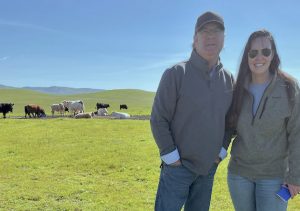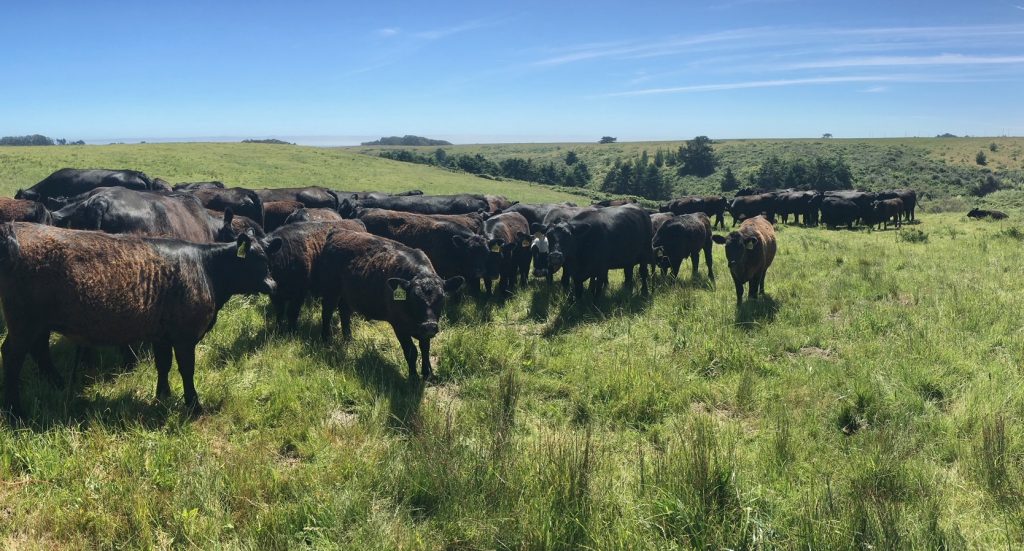
One-pager Regenerative Meat Work (1)
Creating a Resilient and Healthy Meat Supply
Until very recently American agriculture policy has been degrading a once rich fabric of local meat sources. Since 1967 seven thousand meat processing plants have closed. Only 3,000 remain, of those, many small and mid-scaled independent plants are on the verge of financial collapse. Today three multi-national industrial meat companies control over 80% of the US meat supply. These near monopolies force down prices paid to farmers and ranchers and force up prices paid by chefs, food service and eaters. The droughts and wildfires of the last twenty-five years have exacerbated the challenges. The COVID-19 pandemic forced policy makers and consumers to finally face the fact: our meat supply chain is too concentrated, unfair and unstable for the 21st century.
Seeing the moment to ensure a fundamental shift, we have taken action. Our response has roots stretching back to 2009 when we joined with USDA to host a Foodshed Summit where then San Francisco Mayor Gavin Newsom championed the idea of re-regionalizing our food system.
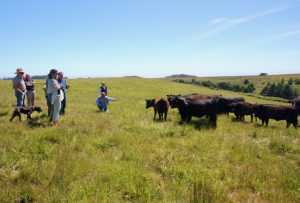
Regenerative ranching became a focus in 2017 when we hosted a special event at BN Ranch in Marin County, hosted by Bill Niman and Nicolette Hahn Niman. In the spring of 2020 during the pandemic, Roots of Change joined with the UC Davis Food Systems Lab to write a white paper on the challenges in the meat supply chain. Plants closed as workers became infected and died from COVID 19. The breakdown intensified on May 30th with the cyber ransomware attack on JBS, the largest meat processor and marketer in the world. Grocery meat sections emptied, prices skyrocketed.
Our white paper clarified California lacks regionally available processing that serves mid- and small-scale producers and outdated regulations impede access to multiple market channels. Our findings emerged from approximately 100 interviews with beef, poultry, lamb and pork producers, processors, and advocates. The paper led to funding from a USDA AMS Regional Food Systems Partnership Grant to develop high value markets for mid and small-scale meat producers who use regenerative, organic and grassfed production systems. With these funds we met with 200 farmers and ranchers between September 2022 and May 2023.
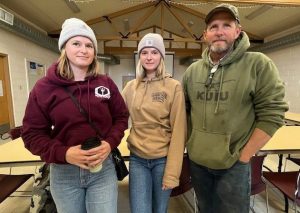 |
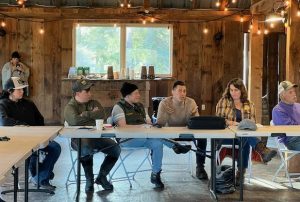 |
|
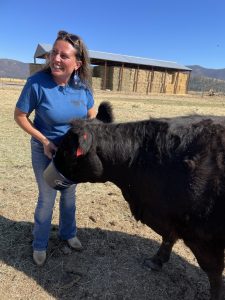 |
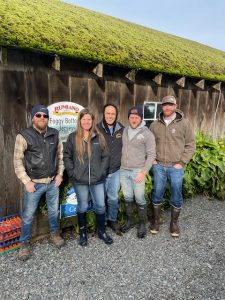 |
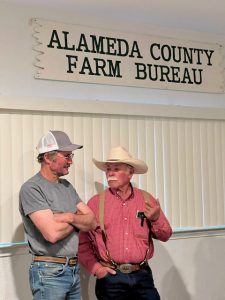 |
A few photos of our meetings with ranchers from 18 different counties across Northern California. Top row, l-r: rancher meeting in Woodland (Napa, Solano, Yolo counties), Marin/Sonoma rancher meeting at Stemple Creek Ranch, Meeting, ranch visit to Copper Rock Farm after the meeting for Calaveras/Tuolumne counties in Jamestown. Bottom row: ranch visit during visit to Siskiyou county; group shot of meat project team and ranchers in Eureka for Mendocino, Humboldt and DelNorte counties; and lastly, ranchers chatting at final meeting in Livermore for Alameda/Contra Costa counties.
Ranchers explained that they can sell most of their high value cuts (steaks, ribs and chops), but are often left with accumulations of grinding and braising cuts. These are just the cuts sought by food service companies. In response, we have embarked on a three-phase market development strategy. First, we are facilitating formation of a supply-chain partnership with the University of California which serves 600,000 meals per day during the academic year on its ten campuses and five medical centers. We aim to scale up the existing Beef2Institution pilot that includes a Roots of Change advisor from UC Davis Health, the pioneering Culinary Director and Executive Chef Santana Diaz.
June 28, 2023 Summit in Sacramento
After months of planning, on June 28, 2023, at Mulvaney’s B&L in Sacramento, we brought all the links in the proposed supply chain together for a Regional Regenerative Meat Summit. They were joined by federal, state and University procurement officials who set context and offered endorsement for the concept.
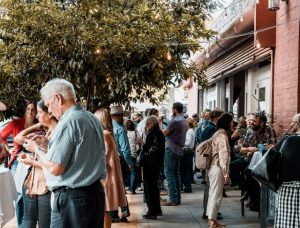 |
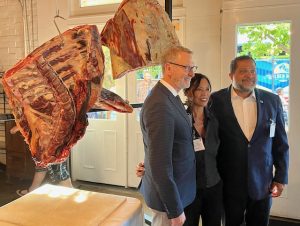 |
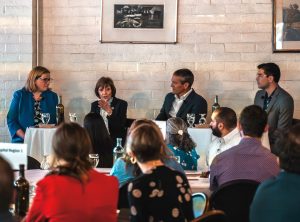 |

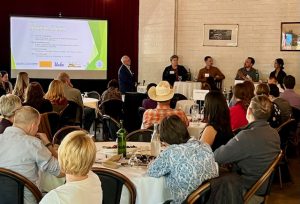 |
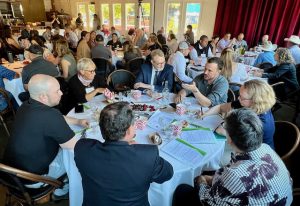 |
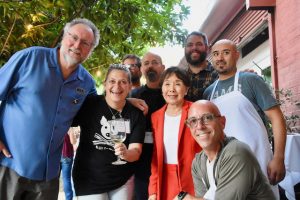 |
Top row, left-right: outdoor reception; representatives from the University of California Office of the President: Scott Wilkerson, Chief Procurement Officer Systemwide Operations, Marilyn Biscotti, Senior Commodity Manager, and Paul Williams, Chief Procurement Officer and Associate Vice President; panel discussion with USDA Under Secretary Jennifer Lester Moffitt, CDFA Secretary Karen Ross, California Resources Agency Secretary Wade Crowfoot and Derek Kirk, Assistant Deputy Secretary of the California Labor & Workforce Development Agency.
Bottom row, from left to right: panel discussion with Dr. Glenda Humiston, UC graduate Mark Biedlingmaier, Connor Hackett, producer, Ferndale Farms, Marilyn Biscotti, Senior Commodity Manager, UCOP; brainstorm session with rancher, government, UC and regional non-profit representatives at each table; group shot with Check Patrick Mulvaney, Chef & producer Duskie Estes, Black Pig Meat Co, Congresswoman Doris Matsui and local butchers.
Images: Michael Manansala, Doris Meier, Karen Preuss
The 100 Summit participants began the work of defining the process and definitions needed to achieve our goal. The event ended with a dinner featuring meats from several of the ranchers working with us. Hit these links to see the Summit program, dinner menu and photos of the event. Hit this link to see video clips of the two panel discussions and presentations and here is the link to the full Summit report.
March 11, 2024 Meat Workshop in Novato
In phase two, we sought additional market channels to farm-to-table restaurants and butcher shops and support development of direct sales to consumers.
On March 11, ROC along with project partners UC Davis Institute of the Environment and IC-FOODS delivered an all-day sold out workshop for stakeholders along the Northern California regenerative meat supply chain to increase the system’s resilience. 130 animal producers, processors, butchers, buyers, and brands along with direct-to-consumer marketing and regenerative agriculture experts gathered at restaurant Toast in Novato to network and learn from each other. Panel discussions included Infrastructure & Processes for Meat Business Success; Approaches for Direct Marketing, and Defining Regenerative Agriculture. Virginia Jameson, Deputy Secretary of CDFA was on the latter panel. As CDFA is currently in the process of defining regenerative agriculture for the state of California her presence and involvement was quite timely and important.
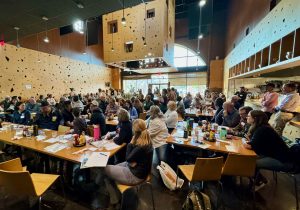 A packed full-day workshop at restaurant/event venue TOAST in Novato on March 11, 2024. |
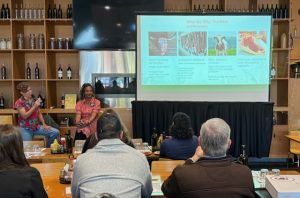 Rebecca Thistlethwaite (l) of Niche Meat Processor Assistance Network and Michele Thorne (r) of Good Meat Project presenting on Infrastructure & Processes for Meat Business Success. |
||
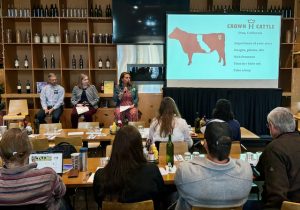 Joe Morris, Morris Grassfed; Katie Olthoff, Chop Local; and Regina Hanna from Crown Cattle sharing tips on direct marketing for regenerative meat businesses. |
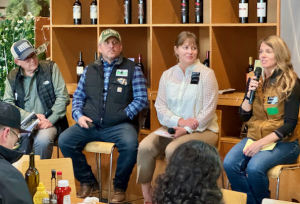 Panel on What is Regenerative Agriculture with Loren Poncia (2nd from left), Stemple Creek Ranch, Virginia Jameson, Deputy Secretary, CDFA and Carrie Richards (r), Richards Regenerative. |
||
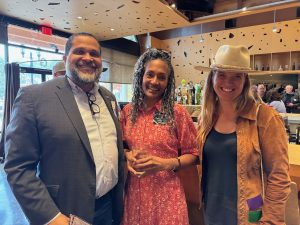 Paul Williams, Chief Procurement Officer, University of California; Michele Thorne, Good Meat Project; and Doniga Markegard of Markegard Family Grassfed networking during a break. |
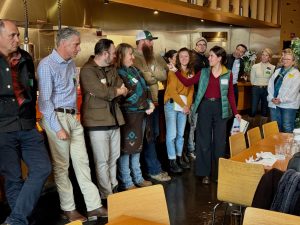 Ranchers, processors, chefs, butchers, and buyers introduce their businesses to participants. |
||
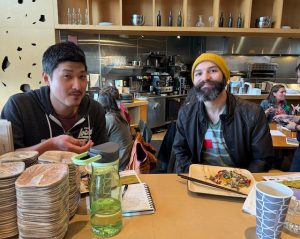 Koji Fujioka (l) and Caleb Avalos from The Local Butcher Shop, Berkeley, enjoying the Fajita lunch and taking a break. |
 There were plenty of opportunities for participants to connect and network, and have a bit of fun. |
||
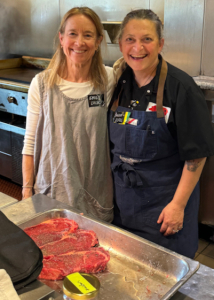 Chefs Emily Lucchetti (l) and Duskie Estes (r) preparing ribeye steaks for the blind meat-tasting reception which compared previously frozen vs. fresh ribeye steaks. Frozen meat won! It was ranked more tender and flavorful. Emily also provided her famously delicious cookies for dessert. |
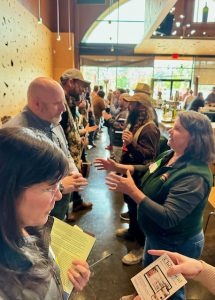 Speed dating type exchanges of business needs to maximize networking efforts. |
Images: Doris Meier
In phase three, we will sought to include the California State University system and sports stadiums. Expansion of processing capacity is part of each phase. Thus, we integrated our approach with the California’s Community Economic Resilience Fund program. This is the state’s largest economic development program ever. It provides nearly $500 million of economic development money across the state. Meat processing is on the fund’s agenda.
PROJECT UPDATE ZOOM CALLS
Click HERE for RECORDINGS of our regular Regenerative Meat Project Zoom call updates.
FINAL EVENT: November 18, 2024 in Sacramento
The 3rd CA Regenerative Meat event on November 18th, at Mulvaney’s B&L in Sacramento was another sold out event attended by many small to mid-size ranchers and producers as well as butchers, chefs and non-profit leaders from near and far. The goals were to celebrate the achievement made over the last three years of the project, explore emerging market opportunities and discuss potential paths forward for remaining challenges. Here a link to the event program.
To watch the panel recordings, subscribe to the ROC’s YouTube channel here.
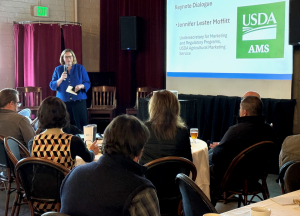 |
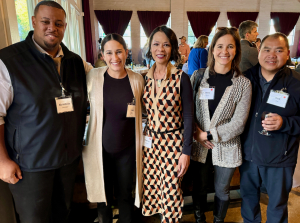 |
|
| USDA Undersecretary Jennifer Lester Moffitt gives the keynote and dialogues with the audience. | From l-r: Abimbola Odusoga, UC Office of the President; Yael Kotick, Alice Waters Institute for Edible Education and Regenerative Agriculture; Marilyn Biscotti and Agnes Martelet, UC Office of the President; Kue Her, Executive Chef UC Davis Med Center. | |
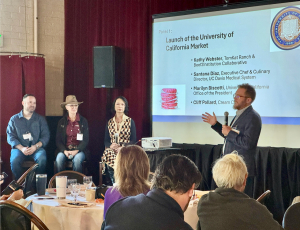 |
 |
|
| Marilyn Biscotti, UC Office of the President, gave a much anticipated update on the increase of regenerative meat supplied to the UC system since the beginning of our project. Cliff Pollard, CEO of Cream Co. Meats, shared some challenges in aggregating products from many different sources but was confident in their ability to handle the increased volume to supply the UC system. | CDFA Farm to School Program Manager Nick Anicich, Sarah Keiser from Wild Oat Hollow, Jim Kleinschmit from Other Half Processing and Growing GRASS, and Steve Schwartz from Interfaith Sustainable Food Collaborative shared New Market Opportunities. | |
 |
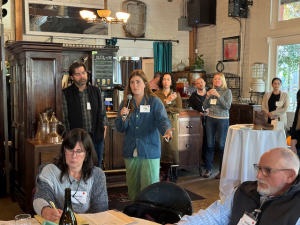 |
|
| Michael Delbar, CA Rangeland Trust and Loren Poncia, Stemple Creek Ranch, addressed Remaining Challenges and Solutions in a dialogue with the audience | The audience was very engaged, asking pointed questions in terms of barriers for small producers getting into the supply chain, and offered opinions on the definition of regenerative ag. | |
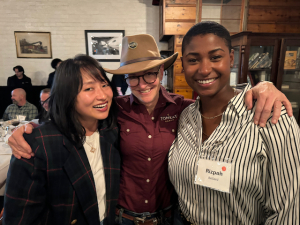 |
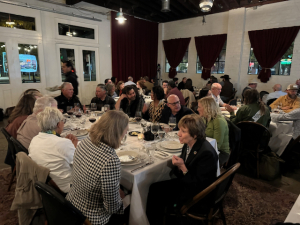 |
|
| Anica Wu, Kathy Webster and Rizpah Bellard. | The event was followed by a delicious dinner with local regenerative meat. |
Images: Doris Meier
